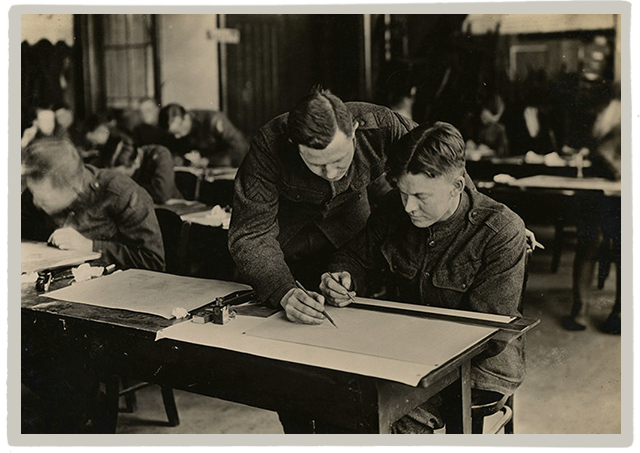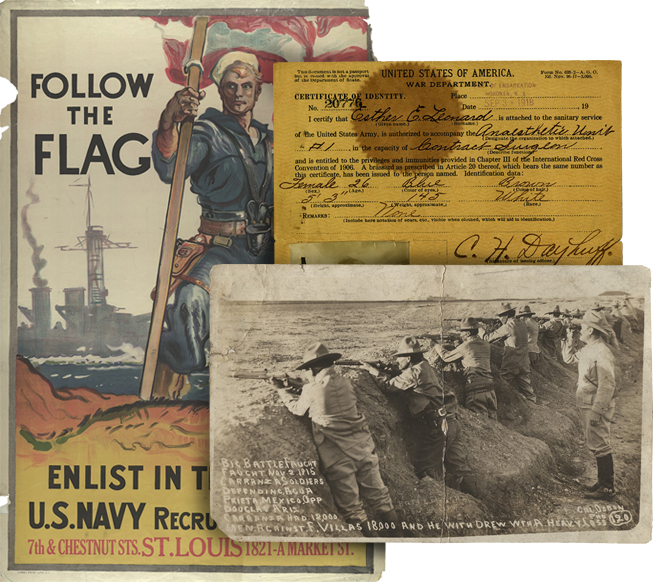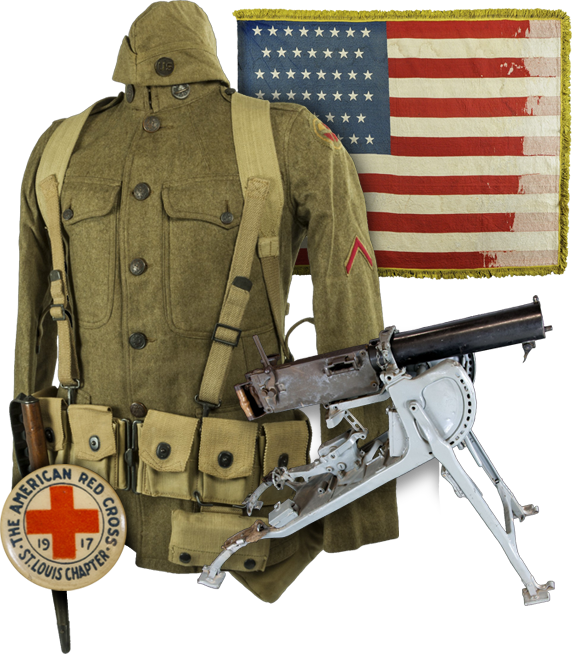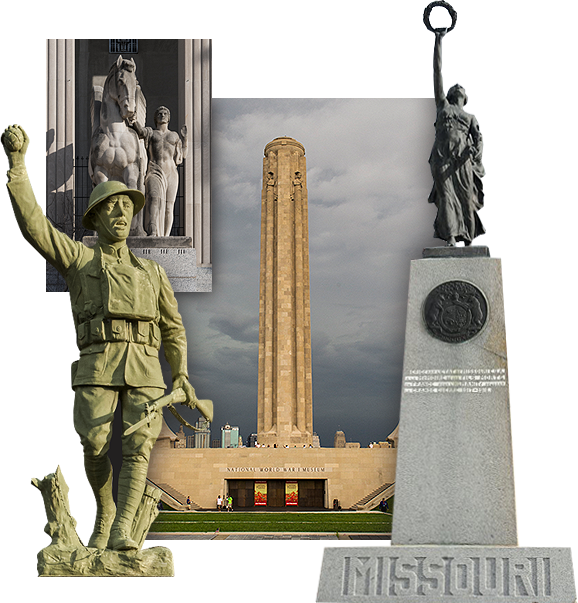John H. Thacher letter to Pards - January 19, 1919

Transcript
American Expeditionary Forces. 1st. Bn. 129 F.A. [January] 19th. 1919. Dear Pards;- Your letter of the 20th. ult. came through on a comparatively speedy trip. We are orphan children up here in the beech-nut woods of the Verdun front and as our Division headquarters are down at Commercy the devious paths of our letters to and from the home folks are like the trail of a Kansas Prohibitionist on his first night in a wet Missouri town. This, to prepare you for the fact that I have had just one letter from you since the armistice and have written several to you. Have however received several of your staelthily concealed chocolate bars, your round of Pall Malls and the K.C. [Kansas City] Stars come rolling right along in luscious, fat bundles of nostalgia antidote. Have also had a perfect flood of home sunshine from your excerpts-chain. Sam Moore, Mr. Minty, John Hanna, Thornton Cook, Wm. Reid, Mr. Broadnax, Frank Hall and a lot more. The good, patient souls! To permit themselves to be sandbagged for a nice gift to the sodger-persons and then come right back smiling when they are held up for a cheerful, friendly letter to boot. My hat is off to the secondary fighting line over there. You’ve had all the drudgery and none of the real fun of the game. The “Mess Fund” sprinkled its generous torch over certain spots in this regiment on the 25th. of last month. It was like the ghost of Christmas Present in the Christmas Carol. Our ration issue is an uncertain wheel of fortune. On Christmas Eve the ball just about hit the double zero. The Christmas packages had not come through and the meat issue was just plain, ordinary, abominated Corned Willy. It is’nt always that way and we have plenty to eat now, but Christmas just simply wasn’t in the Q.M. Calendar, this year. And that was where Old Father Mess Fund just naturally walked out and enjoyed hi’sself. I had alittle chat with Harry Truman and he sent some of his most trained chow scouts out to comb every nook and corner of this devastated land. Also I sent out my Irish Sergeant Major with a bunch of francs to fine the elusive “eoff” and “polulet” and “Vin Rouge”. Those boys walked 28 miles and brought back eleven dozen eggs with them. Then the Battery “D” bandits dug up a large and corpulent lady pig of just about the pro- [proportions]
Description
Letter from John H. Thacher to his law partners at Rozelle, Vineyard, Thacher & Boys. Thacher thanked them for the newspapers and chocolate bars. He also described his recent Christmas celebrations. Before the war, Thacher worked as an attorney with the firm Rozelle, Vineyard, Thacher, and Boys. He served on the Mexican Border and was later drafted into the Federal Army as Captain of the 129th Field Artillery. After Harry S. Truman took command of the 129th Field Artillery, Thacher was appointed adjutant of the 1st Battalion of the 129th Field Artillery , and later assumed command of the 110th Ammunition Train of the 35th Division.

Transcript
[proportions] to furnish “two rounds sweeping” on the Battery table. You ought to have seen that Mess Hall! Picture it for yourself. A dingy little shack, tacked over with tar-paper to keep out the snow --an island in a sea of mud-- but inside! Christmas greens, mistletoe, a piano snitched out from Lord knows what French billets. And crammed with singing and cheering American boys, thinly disguised as soldier-men --all smoking when they weren’t stoking and Tommy Murphy singing in his melodious tenor, “Oh, how I hate to get up in the morning” and the tables loaded with roast pig and jam and beans and, at the supreme moment of climax---pie! One of the bows from Headquarters had borrowed a violin from some poilus and made it sob in melodies of home and wives and sweet-hearts and kids and all the rest until the Battery “D quartette had to step in with “Keep your head down Allemand” in order t to restore the morale of the occasion. It was a real Christmas and nobody thought of suggesting that we were a long way from the firesides that---well, nobody spoke of them anyhow. The sob-stuff is a long way down deep in the artilleryman’s ego and it does’nt get to the surface often ---once in awhile when the mail bag comes in but not often. Now we are making time just as we did at Laredo on the Border. We drill and have schools of Transportation and Firing and Gas and other things. We dodge the spectacled high-brow Inspector bloke who has smelled more text books than front-line battle smoke and who wants to know why the oats are not boiled in the morning and kept warm all day and fed to the oat-hounds at night and why the men’s leather jerkins are worn on the outside of the fatigue clothes and other similar matters that will gravely affect the League of Nations. Last Sunday night we heard there was a minstrel show from the 110th. Amunition Train wandering round loose in these barbed wire hills and we started out to capture it for to cheer up our battalion. We found an old “Foyer du Soldat” shed--dirty, cold, dark, full of old straw from bed-ticks and altogether unpromising as a home of Thespis. But we turned the three batteries loose on it and made a first-rate Muehlbach, -Comedy-Club-theatre out of it between daylight and dark. Cleaned it out, wired it, got lights and power from headquarters, built a solid and substantial stage, put in stoves, benches, poster proscenium, curtain and “foots.” Borrowed an old, half-wrecked
Description
Letter from John H. Thacher to his law partners at Rozelle, Vineyard, Thacher & Boys. Thacher thanked them for the newspapers and chocolate bars. He also described his recent Christmas celebrations. Before the war, Thacher worked as an attorney with the firm Rozelle, Vineyard, Thacher, and Boys. He served on the Mexican Border and was later drafted into the Federal Army as Captain of the 129th Field Artillery. After Harry S. Truman took command of the 129th Field Artillery, Thacher was appointed adjutant of the 1st Battalion of the 129th Field Artillery , and later assumed command of the 110th Ammunition Train of the 35th Division.

Transcript
piano, nailed two planks together for pedals and had a back drop and wings and three “sets” You’d never guess how much music there is in a cigar box guitar or a hack-saw with apadded hammer. Right there is where you have to hand it to the American kid soldier, again. His fiendish ingenuity and freakish humor. Over at Verdun where the somber old Meuse flows under the shell-scarred walls we saw, the other day, two dough-boys put-putting up the current under the shell-scarred walls lolling with magnificent ease in an old scow that they had raised from the mud and fitted with a cast off motor from a salvage dump. The French lined the bank and watched with the troubled look of a small pup with his head on one side trying to understand the antics of the pet coon. To these polite and polished allies of ours we must be a strange, uncouth, inscrutable tribe. This astonishing Western savage-- who comes in an army of two million, raised over night, brushes aside all military precedent, fights like Hades for France, then turns and steals France’s choicest furniture from billets for firewood, cussees everything French when the price of eggs is raised on him, wounds the Frenchmen consideraable in his finer sensibilities by calling him “Frog” makes parodies on his marching-song “Madelon”, feeds, and fraternises with German prisoners, sneaks grub out of his mess-line for friendless Russians on their way home, rides like a demon, curses like a maniac, helps the peasant at his ploughing, attracts little children to him like a magnet and grins at everything! And on top of that he seems to have but one stern, unswerving ambition in life and that is to collect German souvenir helmets. Am hoping to beat it for Paree and Nice, tomorrow on my long awaited leave. If you hear of somebody swimming up New York harbor--that’s me. I’ve just natcherly kept agoin’, when I got to salt water. Yours regardless, John Thatcher Capt. 129 F.A. Censored. [signature illegible] Capt. F.A. P.S. Say, whats the matter with that good old scout one F.F. Rozelle I remember that young feller just as though it wuz yisterdy. He used to sell me things when he wanted something to do on a rainy day. Hosses and houses and sech. He was a great feller on cement. He just coudnt keep his hands outen it. Pulled about $17000 out of a cement bin one time. Then throwed it back in again. Tell him to drop me a line. What ever became of my little mare? J.H.T.
Description
Letter from John H. Thacher to his law partners at Rozelle, Vineyard, Thacher & Boys. Thacher thanked them for the newspapers and chocolate bars. He also described his recent Christmas celebrations. Before the war, Thacher worked as an attorney with the firm Rozelle, Vineyard, Thacher, and Boys. He served on the Mexican Border and was later drafted into the Federal Army as Captain of the 129th Field Artillery. After Harry S. Truman took command of the 129th Field Artillery, Thacher was appointed adjutant of the 1st Battalion of the 129th Field Artillery , and later assumed command of the 110th Ammunition Train of the 35th Division.
Details
| Title | John H. Thacher letter to Pards - January 19, 1919 |
| Creator | Thacher, John H. |
| Source | Thacher, John H. Letter to Pards. 19 January 1919. John H. Thacher Papers. Harry S. Truman Library and Museum, Independence, Missouri. |
| Description | Letter from John H. Thacher to his law partners at Rozelle, Vineyard, Thacher & Boys. Thacher thanked them for the newspapers and chocolate bars. He also described his recent Christmas celebrations. Before the war, Thacher worked as an attorney with the firm Rozelle, Vineyard, Thacher, and Boys. He served on the Mexican Border and was later drafted into the Federal Army as Captain of the 129th Field Artillery. After Harry S. Truman took command of the 129th Field Artillery, Thacher was appointed adjutant of the 1st Battalion of the 129th Field Artillery , and later assumed command of the 110th Ammunition Train of the 35th Division. |
| Contributing Institution | Harry S. Truman Library and Museum |
| Rights | Documents in this file are in the public domain. |
| Date Original | January 19, 1919 |
| Language | English |



